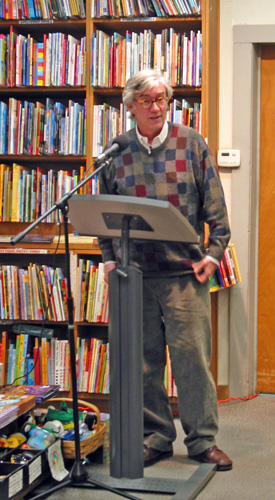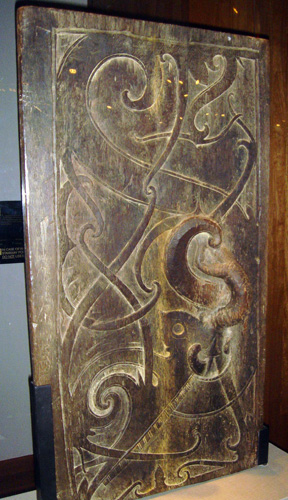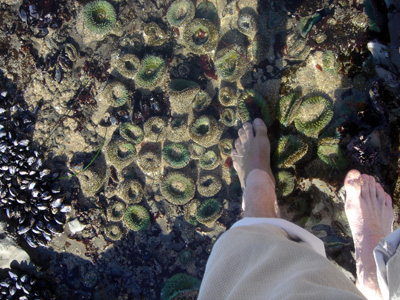
At the very end of Postsingular, I make everything in nature become alive by giving everything endless memory. And now I’m gearing up for a sequel with working title After Everything Woke Up. In my notes I call the two novels PS1 and PS2 for short. Right now I’m busy figuring out how to write a sequel in a world that’s turned so weird and panpsychic.
I guess we’d adjust. Already my car talks to me, so does my phone, my computer, and my refrigerator, so I guess we could live with talking rocks, chairs, logs, sandwiches. But they’d be really smart, not like chirping electronic appliances, which is really kind of different.
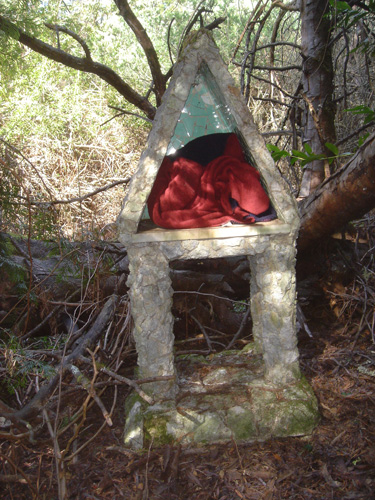
How did everything wake up? The technique has to do with strumming a magic harp to unfurls the wastefully rolled-up eighth dimension of space, creating an extra axis upon which any particle or system can store bits about its previous states. This works because (in my opinion):

Life = universal computation + memory

The more I look at things like air currents, swaying trees and, above all, flowing water, the more I become convinced that in fact the majority of analog natural processes are class four and (probably) universal.
But there is something missing in a brook or a swaying tree or a flame, something that keeps it from being alive in the sense that we use the word. And the burden of this ongoing SFictional thought experiment of mine is to present the missing piece as being memory. If this is too confusing, just think of everything being a quantum computation, and all you need for that is atoms and perhaps light.
As I say, I’m still figuring out how wind, trees, weather, fire will act once they “wake up.” Given the ubiquity of quantum computation, in fact every object will be conscious once the eighth dimension is unrolled. Forest fires will be better at spreading, but perhaps trees will be better at not catching fire. Small objects really will hide under the dresser as I already suspect they do.
And the cursed plague of digital electronic computers will wither away.

In Postsingular I had some higher-level AIs called beezies. Very useful agents in the (then) digital web. So at the time of the Great Awakening, I’m gonna have the beezie migrate into physcial processes. Like a pond, a breeze, a tree, and a campfire.
What would a tree or campfire or waterfall beezie be into? What if they just hang out, feeling that doing nothing is truly more interesting than rushing around like a fidgeting monkey. Final enlightenment is a campfire by a pond with a pine tree. “I only learn to be contented,” as it said on the fountain by the Zen garden at Ryoanji in Kyoto. Well, that’s too limp for commercial SF. Fine. And then some evil cynical developer-media-mogul-peasant types are gonna want to exploit their computational potential. “Get to work on those spreadsheets for the Great Attractor galaxy cluster!”

Philsophers have discussed a certain problem with panpsychism is this: why is there a dovetailing that fits together, say, the collective wills of, atoms, machine parts, subassemblies, automobiles, and traffic streams? Why do my cells happen to want to do what my brain wants for my body? Solution: everyone’s idea of their motives and decisions are Just So stories confabulated ex post facto to create a narrative for what is in fact a deterministic supercomputation. Like our illusion of free will. Of course everythingl fits. “We don’t have to get it together. It is together.”
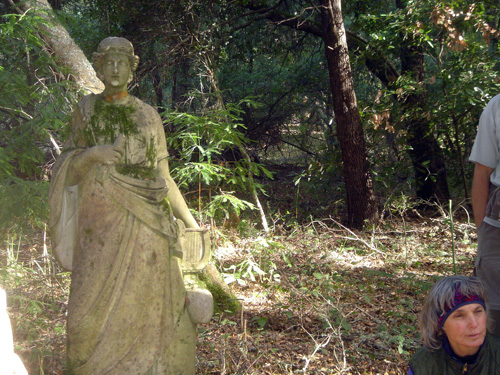
I need a generic word for an uplifted awakened object. A grom. A thunk. A glowie. A sprite. A shoat. A sylph, sylp, silp. Silp might work.
I’m concerned that it might make no functional difference for there to be consciousness in earth (lava, geology), air (wind, vortices), water (falls, riffles), and fire (flames and more generally plants). For it seems like these things have no effectors.
Lazy eight provides sensors, yes, but, lacking effectors, objects seem unable to “do.” They’re stuck being deterministic. But, hmm, thanks to lazy eight, they can in fact write to memory. And to the memories of others. So if they can convince motile agents to do things, then they do functionally have effectors. They can “slave” other objects to act as robot remotes. Plants already do this with insects. They get the insects to move their pollen around.
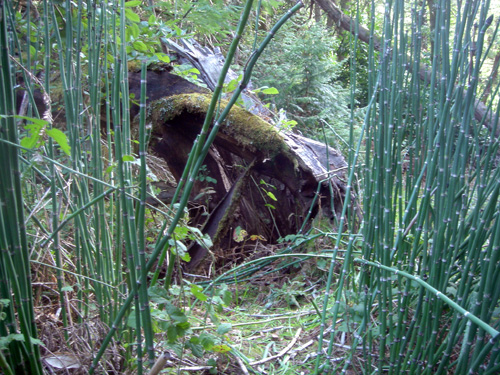
More directly, I might think of silps as quantum computations and say that they do in fact have effectors in that they can change their own matter, perhaps by affecting rates of catalysis, quantum collapses and so on.
If there’s intelligent quantum computation inside a fire, you might see, say, a fire with square flames. Or wavier. Something subtler. Less smoke. It picks up every trick, thanks to the local air slips helping the fire silp.
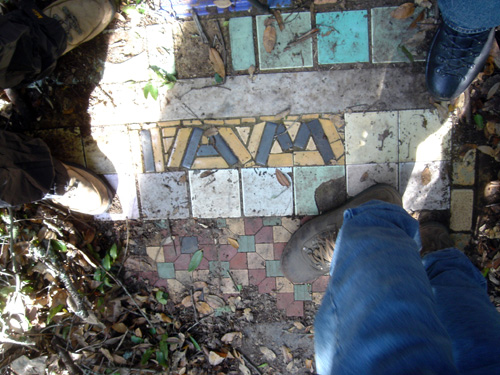
[Tiles in the ruins where Swann took us spell out one of God’s few direct quotes, “I AM.”]
If the silps control their own matter somewhat via quantum computation — if, in other words, every object is to some extent its own effector — then, say, a drinking glass might be harder to break than before. The glass sheds off the vibration phonons in optimal ways so as to avoid catastrophic fracture. Assuming a glass minds being broken. A bean that slyly rolls away to avoid being cooked — sometimes in the kitchen, objects do seem to want to run away.
Does a log mind being burned? It would be a drag if you had to feel guilty about stoking your fire. But maybe silps aren’t so bent on self-preservation? We humans (and animals) have to be like that, so we can live long enough to mate and to raise our young. Otherwise we go extinct. But a log or rocks individual survival doesn’t effect the survival of the race of logs or rocks. Though I suppose if logs were impossible to burn, fewer trees would be sawed down, which would be perhaps a good thing from the viewpoint of the logs.

[Here’s my old SJSU professor colleague Howard Swann. Last week, or maybe it was two weeks ago, he and his wife Anita Dyer took about 30 of us on an amazing hike into the oak-grown gullies of the Santa Cruz Mountains near Glenwood Road.]
Re. the topic of talking to objects, here’s a quote from Finnish poet Pentti Saarikoski’s “The Dance Floor on the Mountains,” translated by my Finnish-American poet friend Anselm Hollo:
I would like to be a poet whose song
gets the stones moving
to organize themselves
into a city wall
the trees walking
to carpenters
who build dwellings for people
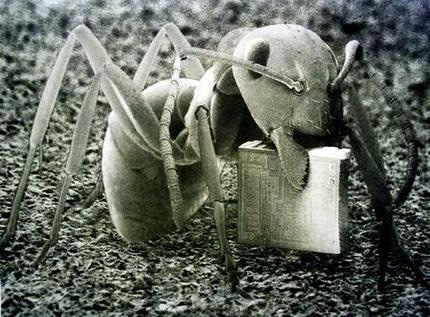
Bruce Sterling recently sent me a link to this nanotech photo, celebrating the fact that he and I recently finished our story “Hormiga Canyon,” which is about string theory, giant ants, and Los Angeles.
